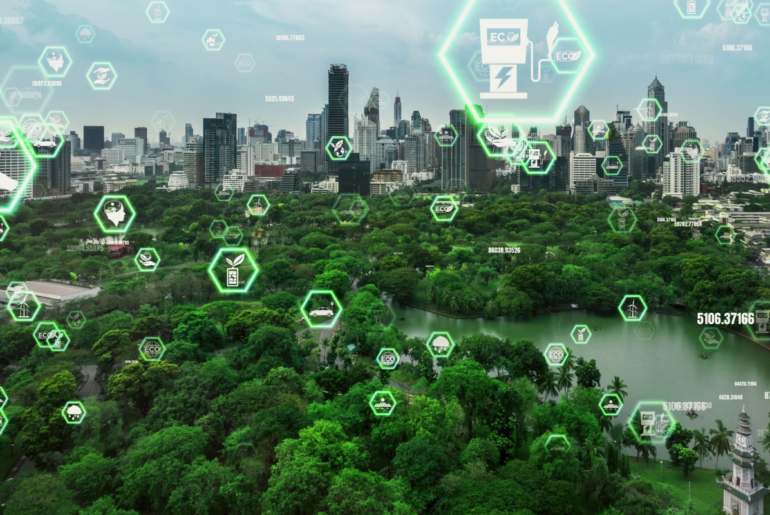Artificial intelligence (AI) has a tremendous potential to accelerate organizations’ sustainable transformation journeys and create business value. AI can help automate ESG data collection and increase the accuracy of reporting, improve operational efficiencies and anticipate and respond to supply chain risks.
However, the use of AI also poses risks that can harm ESG performance, compliance, and trustworthiness. For example, an algorithm bias could lead to unfair or unethical decision making.
As organizations are implementing artificial intelligence into their operations, they need to be strategic about the sustainability-related use cases that generate the greatest financial and non-financial ROI. And, they must be aware of the industry-specific risks that this technology can pose.
IDC recently conducted a comprehensive IT buyer survey uncovering current market trends around sustainability and AI, including pain points, spending intentions, and high in-demand use-cases.
In order to get a more comprehensive understanding of their AI-related value proposition, IT vendors need to understand the full scope of the intersection between AI and sustainability. The different layers are often still presented as disconnected topic areas. According to IDC’s survey, less than 10% of organizations worldwide are currently addressing them through their sustainability/ESG function. This leads to fragmented messaging vis-à-vis their customers and an incomplete picture of their capabilities and responsibilities.
Likewise, IT buyers need to better understand their needs regarding AI-enabled sustainability solutions for the best possible ROI, and they need to be aware of the risks they expose themselves to when leveraging AI across their operations.
IDC’s Sustainability Framework and the Role of AI
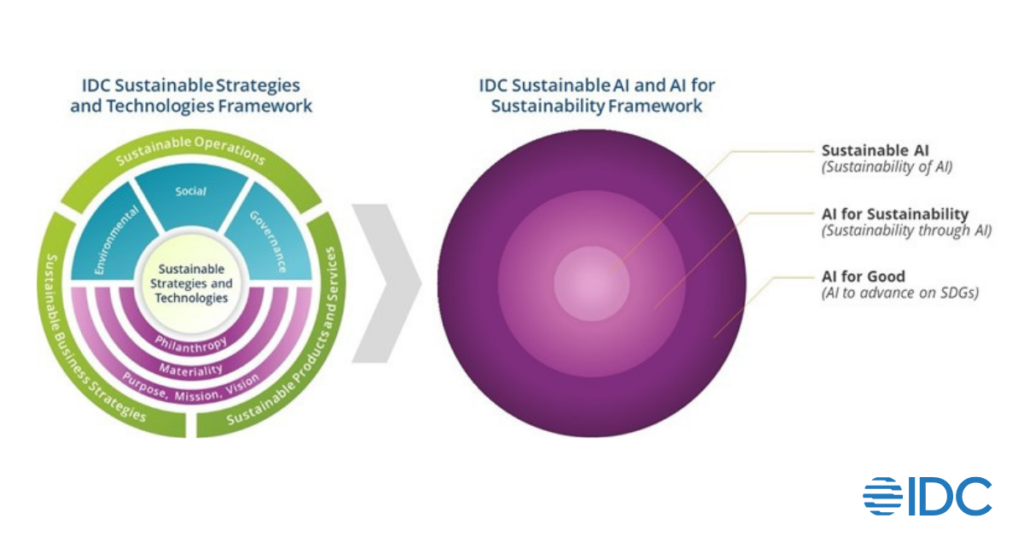
Currently, more than three quarters (76%) of IT decision makers worldwide consider AI and its derivatives to be “critical” or “very important” for their organization’s sustainable transformation journey. More than 40% say that at least half of their AI spend has a sustainability-related component.
Sustainable AI – Managing the Environmental and Social Footprint of AI
The rapid growth of AI is driving up energy and computational demands on datacenters, requiring substantial infrastructure upgrades, as IDC analysts Rob Brothers, Sean Graham, and Shahin Hashim lay out here.
With an increase in power capacity comes a spike in carbon emissions and the building of physical assets that have embedded carbon and need to be decommissioned at some point. GenAI also requires power-hungry GPUs, which, on average, require 10-15 times more energy than CPUs (ibid.). Energy consumption is particularly high at the beginning of the GenAI lifecycle during the training and tuning phases of AI models.
Expanding Power Capacity and Energy Consumption To Meet AI’s Infrastructure Needs
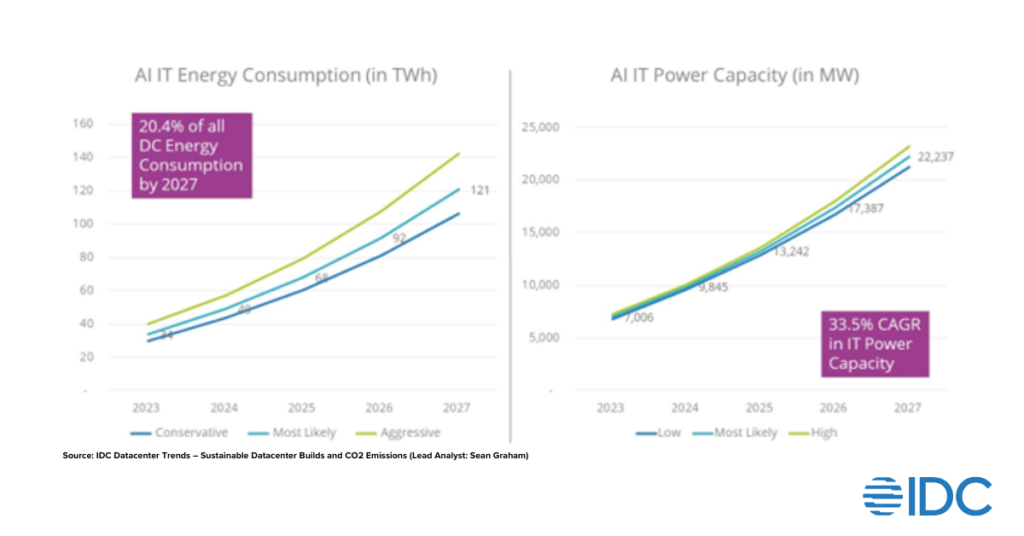
Not surprisingly, environmental concerns are top of mind for organizations when deploying AI/GenAI. One-third of survey respondents said that they only work with or buy from IT vendors that meet certain environmental sustainability criteria. Only 2% said that they do not make buying decisions that factor in environmental considerations.
Practitioners need to also balance the technology’s environmental footprint with its potential social and governance related impact (“Responsible AI”). These issues include biased decision-making and discriminatory outcomes, data security and privacy issues, and unethical business conduct due to the malicious use of AI.
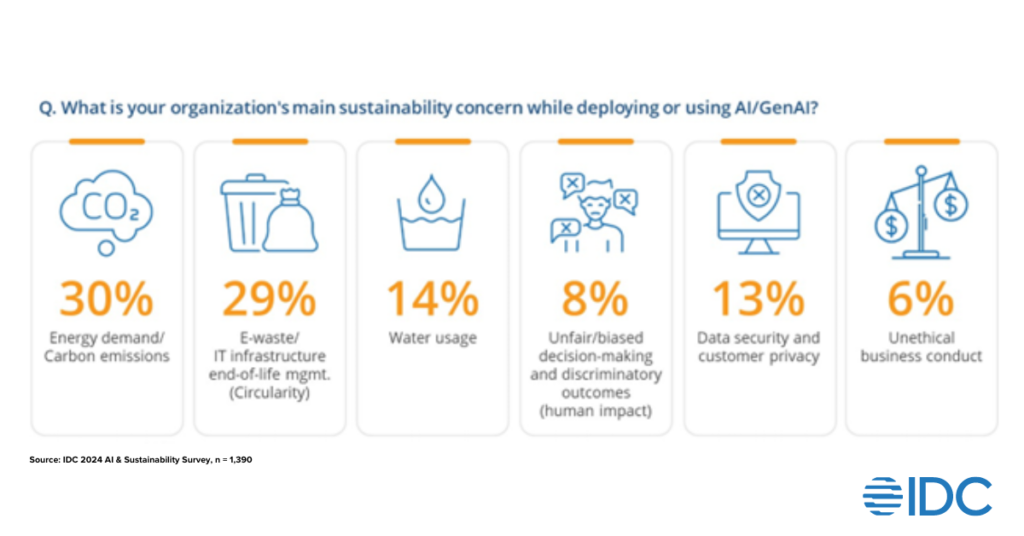
Of course, the materiality of each of these issue areas will be very industry-specific, and practitioners need to understand the concerns and demands of their various ESG stakeholder groups. For instance, these topics are covered by commonly used ESG reporting standards and frameworks (e.g., the SASB standards), which means that ESG investors will have a close look at corporate reporting and performance on these issues.
AI for Sustainability – Identifying the Top Industry Specific Use Cases
GenAI, and AI technologies in general, have the potential to substantially improve and accelerate organizations’ sustainable transformation efforts. The use cases will be very industry-specific, depending on:
- The individual ESG issues areas that organizations need to address.
- Their stakeholder environment.
- The complexity of their supply chains.
- Whether they are delivering physical or non-physical offerings.
Demand for AI-enabled solutions also varies based on maturity and adoption levels. Naturally, organizations that are just getting started on their tech- and AI-enabled sustainability journey will need solutions that can help them get up to speed on meeting regulatory requirements. These organizations are looking for providers that can also help them figure out how to use the products effectively.
Organizations that are further ahead on the maturity curve require more industry-specific nuances in terms of functionality and issue coverage. Vendors will need to be more explicit about the ROI that these solutions can deliver, as they are likely competing against existing or other (new) sophisticated solutions that are procured to improve the delivery of concrete sustainability outcomes.
Priorities and Pain Points by AI for Sustainability Adoption Level
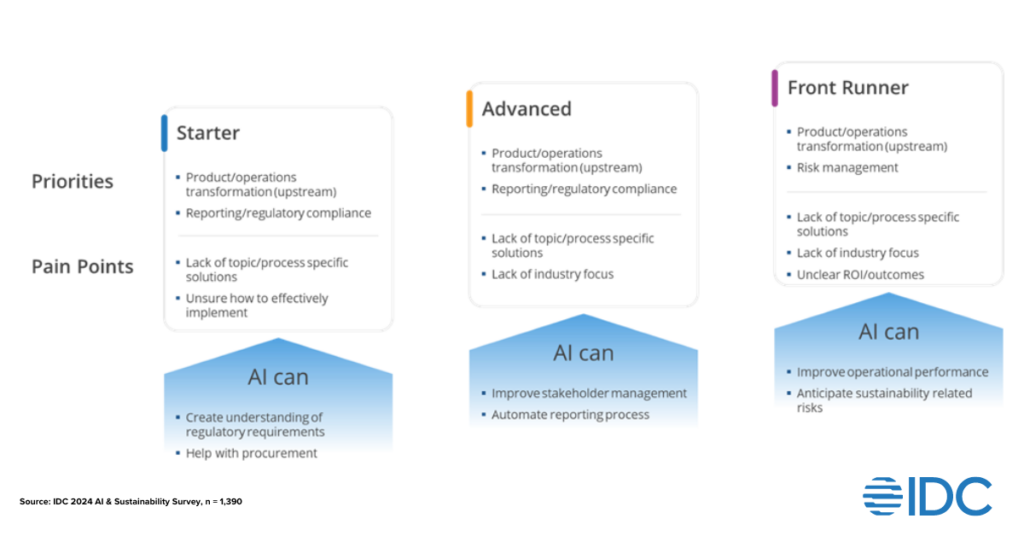
In order to determine the most sought-after use-cases, IDC surveyed current end-user demand for AI-enabled solutions across different dimensions that are essential for building the use-cases. The results help IT vendors develop commercial-grade offerings, and provide peer guidance to IT buyers that are trying to prioritize their AI and sustainability tech spend.
These categories include prioritization of ESG issue areas by industry (e.g., greenhouse gas emissions, waste and water management, human rights management, employee wellbeing and DE&I, etc.), biggest impact regarding sustainability management in the value chain (e.g., sourcing, manufacturing, shipping, end-of-life management, etc.), and challenges around the ESG data lifecycle/journey (e.g., collection of insights regarding the regulatory environment, breaking up of ESG data silos, stakeholder management, ESG report creation, etc.).
Below are examples of the top industry-specific use-cases that emerged for Manufacturing, Retail, Energy, and Life Sciences:
Industry-Specific Use Cases of AI-Enabled Sustainability Solutions
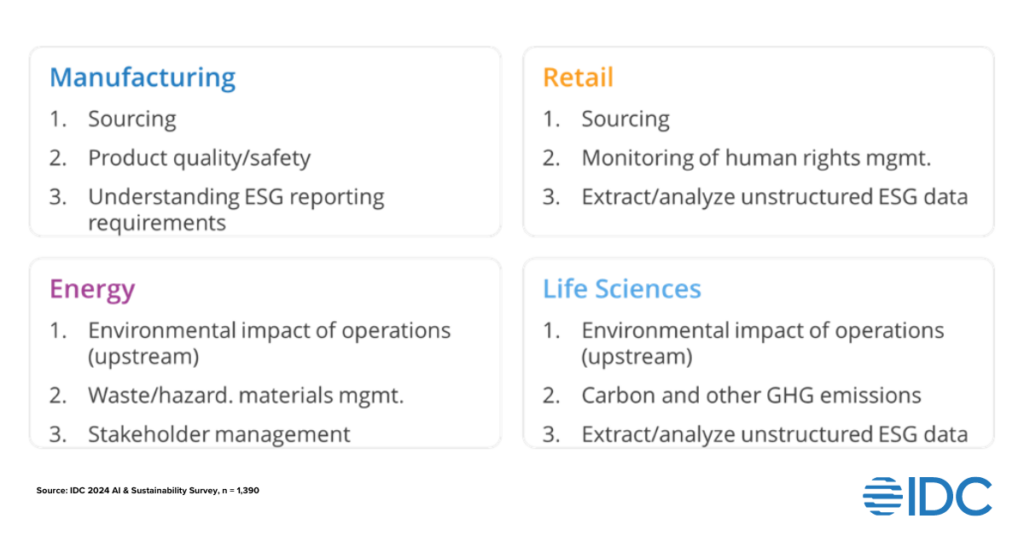
Summary
AI intersects with sustainability/ESG in many ways. Successful organizations look at the intersection from a risks and opportunities perspective and tie their approach to Sustainable AI and AI for Sustainability closely to their overarching sustainable business strategy. This will also require organizational adjustments and alignments, as responsibilities for AI and sustainability span across multiple functions that include IT and LOB personas.
As sustainability strategies become more holistic and ESG materiality more the driver for action, AI and sustainability strategies need to account for the diversity in ESG issues that can be caused by the use of AI, and practitioners need to be able to pick the solutions that truly help address their organization’s most material issues.
For more information on the topic, thought leadership research on sustainability/ESG, and an overview of IDC’s sustainability/ESG analysts and offerings, please visit our sustainability/ESG website.
